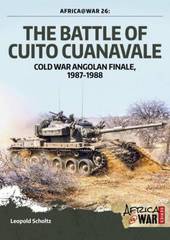
|
The Battle of Cuito Cuanavale: Cold War Angolan Finale, 1987-1988
Paperback
Main Details
| Title |
The Battle of Cuito Cuanavale: Cold War Angolan Finale, 1987-1988
|
| Authors and Contributors |
By (author) Leopold Scholz
|
| Series | Africa@War |
|---|
| Physical Properties |
| Format:Paperback | | Pages:64 | | Dimensions(mm): Height 297,Width 210 |
|
| Category/Genre | African history |
|---|
| ISBN/Barcode |
9781909384620
|
| Classifications | Dewey:967.3042 |
|---|
| Audience | |
|---|
| Illustrations |
8 pages colour photos, c 100 b/w photos, maps
|
|
Publishing Details |
| Publisher |
Helion & Company
|
| Imprint |
Helion & Company
|
| Publication Date |
1 December 2014 |
| Publication Country |
United Kingdom
|
Description
In the broad history of the Cold War, the Battle of Cuito Cuanavale was the climax of a far-off, but nonetheless important African war. It was waged between the apartheid South African Defence Force (SADF) and the armed forces of the communist MPLA government in Angola and the People's Republic of Cuba. Led by Soviet generals, the MPLA embarked on a grand offensive in order to knock out the pro-Western rebel movement UNITA in southeastern Angola. As UNITA's survival was crucial to South Africa's military strategy in fighting its own counter-insurgency war against the South West African rebel movement SWAPO, the SADF stepped in with a single mechanised brigade and broke the back of the overwhelming MPLA offensive. The MPLA forces were subsequently driven back over a hundred kilometres, before the SADF advance was finally stopped just short of the town of Cuito Cuanavale. Since then, a hot war of words have been waged about who actually won. In this book, a South African military historian and retired journalist examines the campaign, the adversaries, and their achievements on the basis of his research in SADF archives. His scrupulous attempt at objectivity results in interesting conclusions. While the MPLA lost hands down, he posits a draw between the Cubans and the SADF. Although having been a South African reservist officer himself, he has critical words for the SADF leadership. Many misunderstandings, some of which were purposefully created by Cuban dictator Fidel Castro, are put to rest. While not sharing Castro's political beliefs, he acknowledges Castro's military acumen and political savvy in extricating his country from an unwinnable war while smelling of roses. The analysis contains many lessons about mechanised warfare in the African context from which both laymen and military professionals alike may learn.
Author Biography
Andrew Hudson majored in military history at the South Africa Military Academy and after two decades as an infantry officer in the South African Defence Force, ten of which were spent in the operational areas, he moved into the private sector. Still a soldier at heart he divides his time between earning an income, indulging his passion for collecting books on conflict in Africa, and road running in weird and wonderful locations. He is co-author of Four Ball, One Tracer: Commanding Executive Outcomes in Angola and Sierra Leone.
ReviewsThe author approaches his subject matter both objectively and passionately. This is a must-read for military historians, political scientists and African scholars. * Insight on Africa * An incredible account of a battle that previously would only have been known about by expert military historians. * Books Monthly * It was a part of the Cold War which is sometimes overlooked, while always reminding me of the ideas of the George Orwell book '1984', where the major Cold War powers fought out their struggle in what was clearly meant to represent Africa. * Military Model Scene * This is a solid account of a battle that was part of several different conflicts, and that ended as a draw that perhaps helped make a reasonable peace more likely. * History of War.org *
|